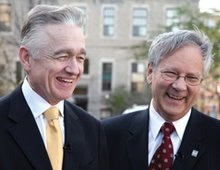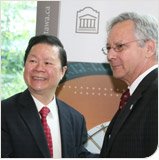
Recall that back in 2007 the University of Ottawa’s dean of the Faculty of Science André E. Lalonde, who is a mineralogist by training, made a fundamental advance in labour management by spontaneously developing a capacity for instant psychological evaluations of his academic staff [LINK].
..
Such progress in management methods can only be of use to society at large if it is shared into the public domain so that other managers can learn these skills. Therefore, UofOWatch investigated this development in human knowledge by making an access to information (ATI) request on April 30, 2008, to identify all records (emails, letters, notes, reports, etc.) related in the broad sense to the dean’s September 6, 2007, LETTER [LINK].
..
The University was obliged by law to search for the requested records and to provide them within 30 days. The University replied on May 15, 2008, that “Access is denied to your request since no such records exist.”
..
UofOWatch appealed the University’s denial of access to the Information and Privacy Commissioner (IPC) of Ontario on June 4, 2008. The appeal was accepted and the case went into mediation. Mediation lasted more than one year and was terminated with the Mediation Report. On July 30, 2009, the case was then moved to adjudication.
..
It is the position of UofOWatch that any “mediation privilege” should not be used as a pretext to prevent unethical or illegal behaviours of institutions from being disclosed.
..
As is shown in the Mediator’s Report and supporting documents (available to media and investigators on request), during mediation the University, in the person of Pamela Harrod, first reaffirmed its position that “no records exist.”
..

The University informed the Mediator that the dean had initiated the LETTER on his own initiative and based entirely on informal verbal conversations with one or more colleagues in the hallways or in his office: The dean had no respondent records.
..
At this point, the University also informed the Mediator that it was prepared to ask the dean to state his position in an affidavit.
..
Wow. Taken at face value, this means that the dean had discovered a way to single-handedly perform a psychological evaluation based entirely on hearsay, of sufficient reliability to write a formal letter insinuating a mental health problem. [From a statistical perspective, given the nature of hallway conversations in academia, the dean presumably would have sent out many such letters?]
..
However, it was not that simple.
..
UofOWatch then asked the Mediator to indeed secure the proposed affidavit and to also secure affidavits of non-involvement from those that the dean might have consulted, such as Pamela Harrod (VP-Governance), Legal Counsel, Robert Major (VP-Academic), and Louise Pagé-Valin (Human Resources). The Mediator also transmitted a list of thirteen University offices where respondent records might be found.
..
At this point, the University refused to provide any affidavits and instead provided an index of eleven respondent records that it now mysteriously found, some four months into the process.
..
The University has refused to provide the records themselves but the index shows that the records are emails between the dean, Major, Michelle Flaherty (Legal Counsel), Pagé-Valin, and others, exchanged mainly during June and July 2007, in obvious preparation for the September 6, 2007, LETTER. Several exchanges have the index subject line “A different tact?”
..
Since Legal Counsel Flaherty is involved in virtually all the emails, it is difficult to understand how her immediate supervisor Pamela Harrod could repeatedly report in the name of the University that “no such records exist,” while required by law to search for and produce all records within 30 days.
..
Oh my my, so the dean, although he does not like to admit it, needs at least a lawyer and his immediate supervisor the VP-Academic to accomplish his feat of psychoanalysis? What is most surprising is the length to which the University is prepared to go in order to not disclose its secret of newfound management abilities.
..
It appears that the dean was prepared to lie to cover the whole mess, but that asking everyone involved to lie under oath (in affidavits) was too much.
..
The next questions are:
- Will the University be ordered to perform another search?
- Will the University be ordered to disclose some or all of the found records?
- Will the IPC Adjudicator use her legal powers to get to the bottom of the case?
- Will the records be disclosed by a parallel legal adventure or investigation?
And finally, will those involved in subverting the ATI law in Ontario (FIPPA) suffer any consequences?
..
[Photo credits: Andre E. Lalonde, comet; University of Ottawa, Andre E. Lalonde.]




No comments:
Post a Comment